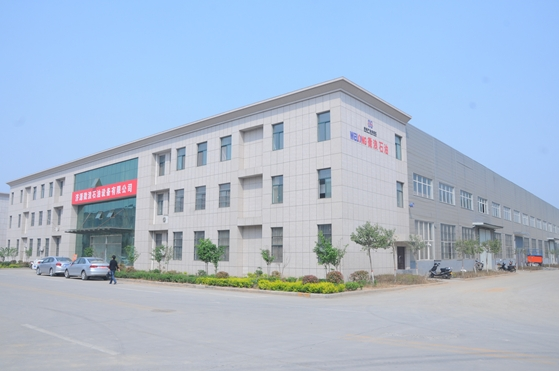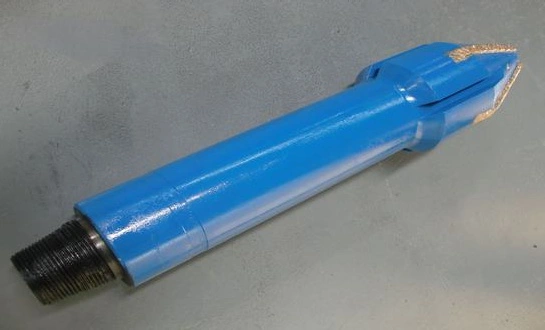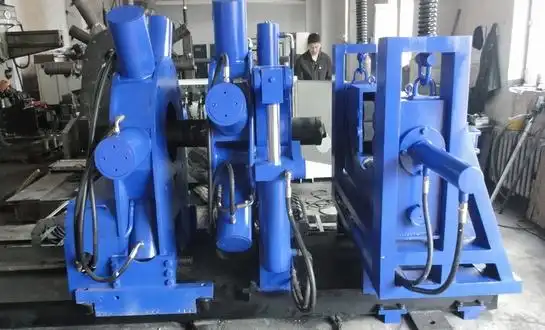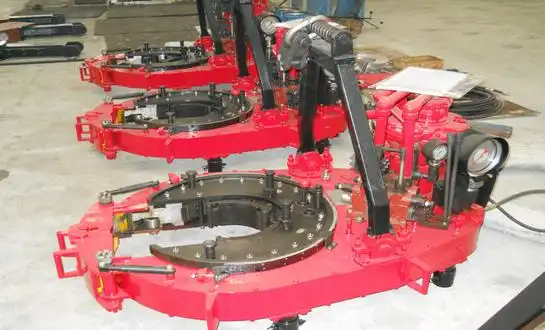The superior strength-to-weight ratio of 42CrMo4 forged shafts allows for the design of more compact yet robust hydraulic components. This material's excellent fatigue resistance and toughness contribute to extended service life, reducing the risk of sudden failures that could compromise safety. Moreover, the forging process enhances the material's grain structure, further improving its resistance to wear and deformation under high loads. For industries relying on hydraulic machinery, such as oil and gas, construction, and manufacturing, the use of 42CrMo4 forged shafts translates to improved operational safety, reduced downtime, and lower maintenance costs.

How does 42CrMo4 forging enhance hydraulic shaft durability?
Improved Microstructure through Forging
The forging process of 42CrMo4 steel significantly enhances the microstructure of the material. During forging, the steel undergoes intense pressure and heat, which breaks down its initial grain structure. This process results in a finer, more uniform grain structure that contributes to increased strength and toughness. The realignment of grains also helps in eliminating potential weak points within the material, leading to a more homogeneous and durable shaft.
Enhanced Mechanical Properties
42CrMo4 shaft forging improves several key mechanical properties that are crucial for hydraulic machinery applications. The forging process increases the material's yield strength, tensile strength, and impact resistance. These enhancements allow the shaft to withstand higher loads and pressures without deformation or failure. Additionally, the improved fatigue resistance ensures that the shaft can endure cyclic loading conditions typical in hydraulic systems, significantly extending its operational lifespan.
Reduced Internal Defects
Forging 42CrMo4 steel helps in minimizing internal defects such as voids, inclusions, and porosity that can be present in cast or machined components. The high pressures involved in the forging process effectively close these defects, resulting in a more dense and uniform material structure. This reduction in internal flaws significantly enhances the shaft's durability and resistance to crack initiation and propagation, which is critical for maintaining the integrity of hydraulic systems under high-stress conditions.
What failure risks are reduced with 42CrMo4 forged shafts?
Fatigue Failure Prevention
One of the primary risks mitigated by using 42CrMo4 forged shafts is fatigue failure. The enhanced microstructure and improved mechanical properties resulting from the forging process significantly increase the material's resistance to cyclic loading. This reduces the likelihood of crack initiation and propagation, which are common precursors to fatigue failure in hydraulic machinery components. The superior fatigue strength of forged 42CrMo4 shafts ensures that they can withstand the repetitive stresses inherent in hydraulic systems for extended periods without succumbing to fatigue-related failures.
Stress Corrosion Cracking Resistance
42CrMo4 forged shafts exhibit improved resistance to stress corrosion cracking (SCC), a phenomenon that can be particularly problematic in hydraulic systems exposed to corrosive environments. The forging process enhances the material's microstructure, making it less susceptible to the initiation and propagation of stress corrosion cracks. This increased resistance is crucial in applications where the hydraulic fluid or external environment may contain corrosive elements, ensuring the longevity and reliability of the shaft under challenging operational conditions.
Torsional and Bending Strength Enhancement
The use of 42CrMo4 shaft forging significantly reduces the risk of failure due to torsional and bending stresses. The forging process aligns the grain structure of the material in a way that enhances its ability to withstand these types of loads. This is particularly important in hydraulic machinery where shafts may be subjected to complex combinations of torsional and bending forces. The improved strength in these aspects ensures that the shaft maintains its integrity even under severe operating conditions, reducing the risk of catastrophic failure and improving overall system safety.

What are the key mechanical properties of forged 42CrMo4?
Tensile Strength and Yield Strength
Forged 42CrMo4 exhibits exceptional tensile and yield strength, which are critical properties for hydraulic machinery components. The tensile strength of forged 42CrMo4 typically ranges from 900 to 1200 MPa, depending on the heat treatment process. This high tensile strength ensures that the shaft can withstand significant axial loads without failure. The yield strength, usually between 700 and 1000 MPa, provides a substantial safety margin against plastic deformation under operational stresses. These properties allow for the design of hydraulic systems that can operate at higher pressures and loads, enhancing overall efficiency and performance.
Toughness and Impact Resistance
The forging process plays a critical role in significantly improving the toughness and impact resistance of 42CrMo4 steel. As a result of the intense pressure and heat involved in forging, the microstructure of the steel is refined, enhancing its ability to absorb energy without cracking or fracturing. This is particularly important for hydraulic shaft applications, where sudden impacts or fluctuating loads are common. A forged 42CrMo4 shaft typically exhibits a Charpy V-notch impact energy of 40-50 J at room temperature, which is notably higher compared to its cast or machined counterparts. This elevated toughness means the shaft is less prone to brittle fracture, even under harsh operating conditions. In hydraulic systems, where components are frequently exposed to high-stress environments, improved impact resistance translates to more reliable and durable performance, reducing the likelihood of failure and downtime.
Fatigue Strength and Endurance Limit
Another essential property of forged 42CrMo4 shafts is their superior fatigue strength and high endurance limit. The forging process, combined with appropriate heat treatment, results in a material that can withstand significant repeated loading over extended periods. For hydraulic shaft applications, this is a key advantage, as the shafts must endure millions of load cycles without failure. Forged 42CrMo4 shafts can exhibit a fatigue strength exceeding 450 MPa at 10^7 cycles, depending on factors like heat treatment and surface finish. This high fatigue strength ensures that the shafts will perform reliably throughout their service life, even in demanding conditions where regular stress and strain are common. The high endurance limit further enhances the lifespan of the components, allowing for longer service intervals and less frequent maintenance. Ultimately, this contributes to the overall efficiency and cost-effectiveness of the hydraulic system, making forged 42CrMo4 shafts an ideal choice for high-performance applications.
Source: CHINA WELONG-Oilfield tools Manufacturer
FAQ about Shaft forging
What is the difference between forged and machined shafts?
Forged shafts are produced by heating and shaping metal under high pressure, resulting in a stronger, more durable component with improved grain structure. Machined shafts are created by cutting away material from a solid block, which can be less expensive but may not offer the same strength and durability as forged shafts. Forged shafts generally have superior mechanical properties and are better suited for high-stress applications like hydraulic machinery.
How does heat treatment affect forged 42CrMo4 shafts?
Heat treatment plays a crucial role in optimizing the mechanical properties of forged 42CrMo4 shafts. Processes such as quenching and tempering can significantly influence the material's strength, hardness, and toughness. Proper heat treatment can enhance the shaft's wear resistance, fatigue strength, and overall performance in hydraulic applications. The specific heat treatment parameters are typically tailored to meet the requirements of the intended application.
What are the cost implications of using forged 42CrMo4 shafts?
While the initial cost of forged 42CrMo4 shafts may be higher compared to alternatives, they often prove more cost-effective in the long run. The superior durability, longer service life, and reduced maintenance requirements of these shafts can lead to significant savings over time. Additionally, the enhanced reliability and safety provided by forged 42CrMo4 shafts can prevent costly downtime and potential safety incidents, further justifying the investment for critical hydraulic machinery components.
In conclusion, the use of 42CrMo4 shaft forging is indeed essential for ensuring the safety and reliability of hydraulic machinery. The enhanced mechanical properties, improved durability, and reduced failure risks associated with forged 42CrMo4 shafts make them an invaluable component in high-performance hydraulic systems. As industries continue to push the boundaries of what's possible with hydraulic machinery, the role of advanced materials like forged 42CrMo4 becomes increasingly critical. For those seeking to optimize their hydraulic systems' performance and safety, considering the implementation of 42CrMo4 forged shafts is a step in the right direction. For more information on how 42CrMo4 shaft forging can benefit your specific applications, feel free to contact us at oiltools15@welongpost.com.
As a leading provider in the industry, Welong is committed to delivering high-quality forged components that meet the demanding requirements of hydraulic machinery applications. Our expertise in 42CrMo4 shaft forging ensures that your hydraulic systems operate with the highest levels of safety and efficiency.




